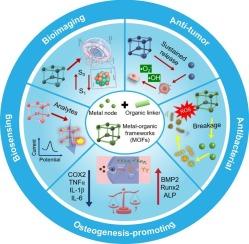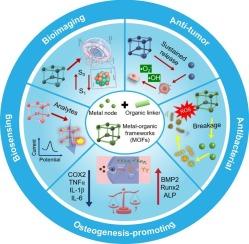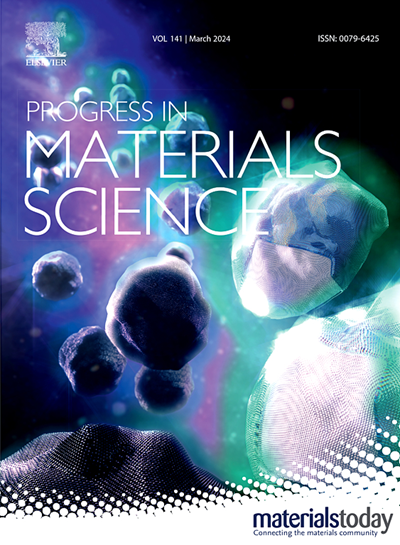Bridging biodegradable metals and biodegradable polymers: A comprehensive review of biodegradable metal–organic frameworks for biomedical application
IF 40
1区 材料科学
Q1 MATERIALS SCIENCE, MULTIDISCIPLINARY
引用次数: 0
Abstract
Metal-organic frameworks (MOFs) represent a category of intricate coordination polymers that are formed by the deliberate assembly of metal ions/clusters with organic ligands via coordination bonds. Their hybrid inorganic–organic composition and programmable structural adaptability endow them with multifunctionality. This integration enables degradation-controlled release of bioactive components, positioning MOFs as a uniquely versatile platform for biomedical applications. This review systematically outlines the structural taxonomy of MOFs and underscores their transformative potential in pharmaceutical delivery, therapeutic interventions, and biomedical imaging applications. The degradation behavior of MOFs is systematically summarized, as it governs the controlled release of guest molecules and metal ions, critically influencing their biosafety and therapeutic efficacy. Therefore, we further summarize the impacts of MOF degradation products in both in vitro and in vivo environments. Finally, we outline the challenges in translating laboratory findings into clinical products, and propose future research directions, so that to guide the rational design and construction of MOF-based biomedical platforms.


桥接生物可降解金属和生物可降解聚合物:生物医学应用的生物可降解金属-有机框架的综合综述
金属有机框架(mof)是一类复杂的配位聚合物,是由金属离子/簇与有机配体通过配位键进行刻意组装而形成的。它们的无机-有机混合组成和可编程的结构适应性赋予了它们多功能性。这种集成使生物活性成分的降解控制释放成为可能,将mof定位为生物医学应用的独特多功能平台。本文系统地概述了mof的结构分类,并强调了它们在药物输送、治疗干预和生物医学成像应用方面的变革潜力。系统总结了mof的降解行为,因为它控制着客体分子和金属离子的控制释放,对其生物安全性和治疗效果具有重要影响。因此,我们进一步总结了MOF降解产物在体外和体内环境中的影响。最后,我们概述了实验室成果转化为临床产品所面临的挑战,并提出了未来的研究方向,以指导基于mof的生物医学平台的合理设计和构建。
本文章由计算机程序翻译,如有差异,请以英文原文为准。
求助全文
约1分钟内获得全文
求助全文
来源期刊

Progress in Materials Science
工程技术-材料科学:综合
CiteScore
59.60
自引率
0.80%
发文量
101
审稿时长
11.4 months
期刊介绍:
Progress in Materials Science is a journal that publishes authoritative and critical reviews of recent advances in the science of materials. The focus of the journal is on the fundamental aspects of materials science, particularly those concerning microstructure and nanostructure and their relationship to properties. Emphasis is also placed on the thermodynamics, kinetics, mechanisms, and modeling of processes within materials, as well as the understanding of material properties in engineering and other applications.
The journal welcomes reviews from authors who are active leaders in the field of materials science and have a strong scientific track record. Materials of interest include metallic, ceramic, polymeric, biological, medical, and composite materials in all forms.
Manuscripts submitted to Progress in Materials Science are generally longer than those found in other research journals. While the focus is on invited reviews, interested authors may submit a proposal for consideration. Non-invited manuscripts are required to be preceded by the submission of a proposal. Authors publishing in Progress in Materials Science have the option to publish their research via subscription or open access. Open access publication requires the author or research funder to meet a publication fee (APC).
Abstracting and indexing services for Progress in Materials Science include Current Contents, Science Citation Index Expanded, Materials Science Citation Index, Chemical Abstracts, Engineering Index, INSPEC, and Scopus.
 求助内容:
求助内容: 应助结果提醒方式:
应助结果提醒方式:


